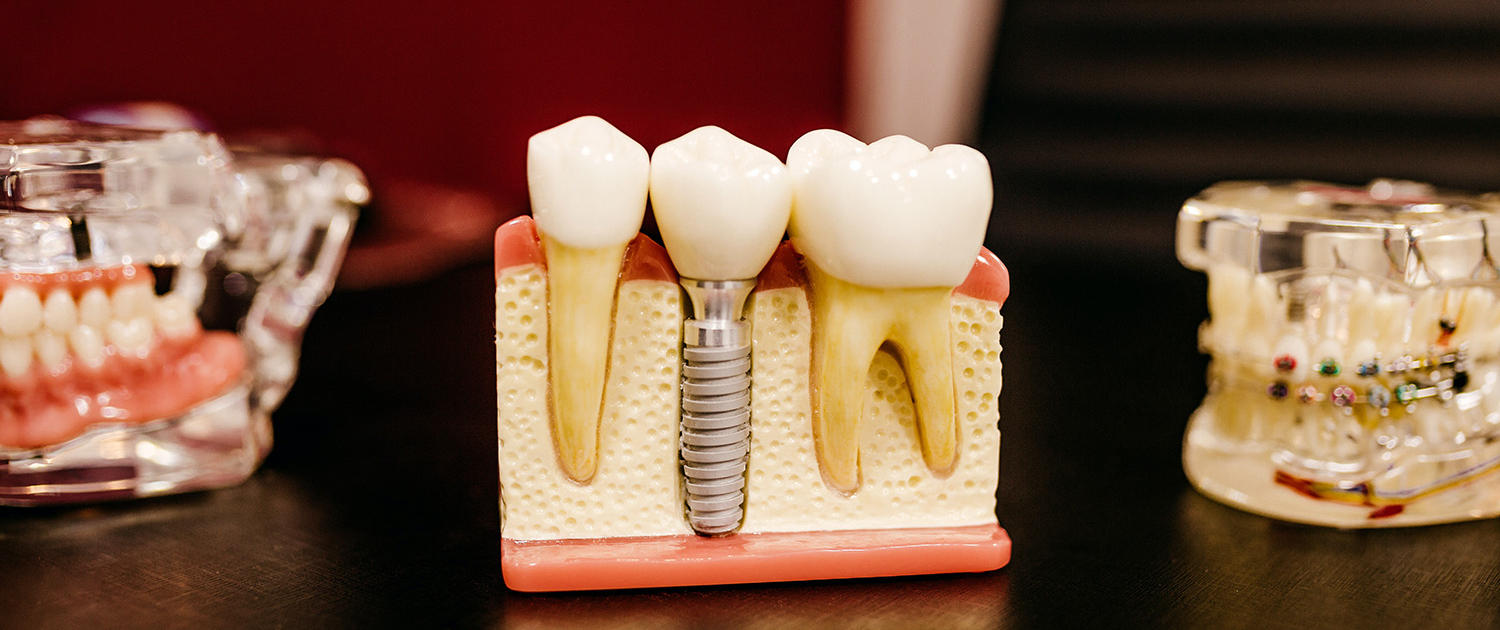Replacement of missing teeth with tooth implants
Dental implants have been used in dentistry for more than 40 years. They are designed to completely replace, that is, functionally and aesthetically, the missing teeth, giving a completely natural result.
What are the tooth implants?
An implant is a small screw made of titanium or zirconium or a combination of the two materials that substantially replaces the root of the missing tooth. Titanium and zirconium are biocompatible materials that are fully accepted by the body and integrate with the surrounding bone. Implants can be placed in case of loss of one or more teeth.
What are the benefits of dental implants?
Replacing missing teeth with implants restores, like all prosthetics, functions such as chewing and speech while giving an aesthetically harmonized smile that in turn gives confidence and good psychology. In addition, the placement of dental implants prevents the loss of bone mass and inhibits the development of the aged face (insufficient support of the lips and insufficient support of the soft tissues and consequently the appearance of deep lines – wrinkles). All these benefits, unlike the classic prosthesis, are achieved without the need for any intervention on the patient’s natural teeth.
How is a dental implant placed?
The placement of the implants includes the following steps:
- Surgical placement of the implant in the jaw
- Osteointegration of the implant (it takes up to 3-6 months)
- Abutment placement
- Take impressions
- Placement of final prosthetic work on the implant (crown, bridge or denture implant).
The surgical placement of the implant as well as its detection are performed using local anaesthesia and are both very painless procedures.
In the interval between the placement of the implant and its final prosthetic restoration, a movable or immovable temporary restoration can be used so that there is no gap. This is at the discretion of the patient when the implants are placed in the posterior areas of the mouth and becomes almost “mandatory” when we operate on the anterior / aesthetic areas of the mouth.
Η2 Howtotake care of the implants after their placement
Implant care is no different from what natural teeth require to stay clean and healthy.
Although the implants are not affected by diseases of the natural teeth (caries), their thorough cleaning is necessary for the benefit of the health of the bone and the gums that surround them.
Implants are at risk for peri-implant mucositis and peri-implantitis which are diseases (of the gums and bone around them) corresponding to gingivitis and periodontitis.
The manifestation of these diseases is favoured by the presence of incurable and ongoing gingivitis or periodontitis, poor oral hygiene and consequent accumulation of microbial plaque, smoking, diabetes, and cardiovascular disease.
The accumulation of germs around the implants causes inflammation of the perimplant tissues.
The implant diseases are classified into two categories: peri-implant mucositis and peri-implantatis.
Peri-implant mucositis
Peri-implant mucositis is an inflammation that develops around the implants and affects the mucosa and the gums.
Inflammation starts due to the accumulation of germs in the area where the prosthetic abutment above the implant encounters the gums.
The gums that suffer from peri-implant mucositis become red and sensitive, swollen and bruised during the practice of oral hygiene with interdental devices.
If the inflammation is left untreated, peri-implant mucositis can progress to peri-implantitis.
Peri-implantitis
Peri-implantitis is the inflammation around the implants that also affects the jawbone leading to its loss which in turn can lead to loss / extraction of the implant.
The treatment of peri-implantitis requires surgery, during which the infected surface of the implant is thoroughly cleaned with various means (antiseptic solutions, brushes, laser), surgical removal of the inflamed tissue, and if there is an indication, based on the anatomy of the lesion, bone regeneration.
How long does a dental implant last?
One of the key questions when considering dental implants is how long the implant will last. According to the scientific literature, the average life of an implant is around 15-20 years. However, in clinical practice, everything depends mainly on oral hygiene, the frequency with which dental examinations and professional cleaning are performed, as well as whether one smokes or not. Modern scientific data emphasize that smoking increases up to 3 times the risk of developing peri-implantitis (loss of bone around the implant).
Can everyone have dental implants?
The placement of dental implants is not recommended in heavy smokers, in people suffering from periodontitis (when the periodontitis has been treated and the disease is under control, the placement of dental implants is not contraindicated), in people who have poor oral hygiene and in case of chronic disease such as uncontrolled diabetes mellitus or in people who have recently undergone radiotherapy and / or chemotherapy.
It is worth noting here that in case there is not enough bone this is not a contraindication for the placement of a dental implant as today there are safe and effective ways to increase and regenerate the jawbone.
How much does a dental implant cost?
Dental implants are almost always accompanied by the belief that they are an expensive treatment. This may be partly true given the numerical dimension of the issue. However, if we consider the biological profit of implant treatment then the profit is greater than the financial cost. This is a treatment that most often is the final, definitive rehabilitation and that in longterm has a better chance of success than any other prosthetic work.
Undoubtedly the financial dimension is very important, make a meticulous dental visit and talk to your dentist who is the most suitable person to give you a thorough opinion suggesting what it is best for you!

